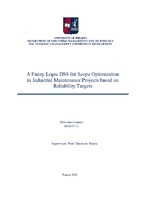A fuzzy logic DSS for scope optimization in industrial maintenance projects based on reliability targets
Ένα υποστηρικτικό σύστημα απόφασης, δομημένο με ασαφή λογική, στοχευμένο στη βελτιστοποίηση φυσικού αντικείμενου έργων συντήρησης με βάση τη θεωρία αξιοπιστίας

Master Thesis
Συγγραφέας
Μητροφάνη, Ιωάννα
Mitrofani, Ioanna
Ημερομηνία
2018-11-24Επιβλέπων
Εμίρης, ΔημήτριοςΠροβολή/
Λέξεις κλειδιά
Διοίκηση έργου ; Project management ; Maintenance ; Fuzzy logic ; Scope optimization ; Scope optimisation ; Decision support system ; Industrial maintenance projects ; Maintenance projects ; Συντήρηση ; Βελτιστοποίηση φυσικού αντικειμένου ; Fuzzy logic DSSΠερίληψη
The aim of this research is to build a Decision Support System (DSS) for scope optimization in large maintenance projects using fuzzy logic concepts. This thesis investigates the maintenance and reliability considerations of industrial systems and builds on basic fuzzy logic strategies to develop an agile and easy-to-use, fuzzy logic DSS for scope definition. The system, once built, is further improved and fine-tuned after examination of the initial results; furthermore, the proposed DSS is contrasted and compared to other systems that use conventional, crisp logic methods that are used to determine the maintenance project scope. The thesis culminates with the evaluation of the system through four illustrative and realistic cases.
Fuzzy Logic was selected as the foundation of our approach as it provides an answer about the need to maintain an item based on a group of criteria. These reliability-based criteria are: the Mean Time Between Failures (MTBF), the Criticality of the item, its Reliability, the Mean Time To Repair (MTTR), the Total Operation Cost (TOC) and the Value of the equipment. The combination of these criteria using fuzzy logic techniques enables the proposed DSS to extract meaningful results on the necessity to maintain an item and hence, assists decision makers to shape the maintenance project scope. The results are presented both as numbers as well as classes and are visually supported by 3D plots.
The comparison of the proposed system with other traditional approaches of the problem, adds robustness to the DSS and helps fine-tune fuzzy decision rules and parameters of the system. The comparison is rich, as it compares results for thirty (30) pragmatic cases, using data obtained from the industry. It is shown, that our DSS generates trustworthy, comparable results, and for certain cases, even more improved ones, thus justifying its use in industrial, large-scale environments.
Our analysis and approach gives important insight on maintenance techniques and sheds new light on alternative scope definition and optimization approaches. The exposed results may well lead to efficient planning of maintenance, especially in complex industrial projects, without being affected by the large data size.


